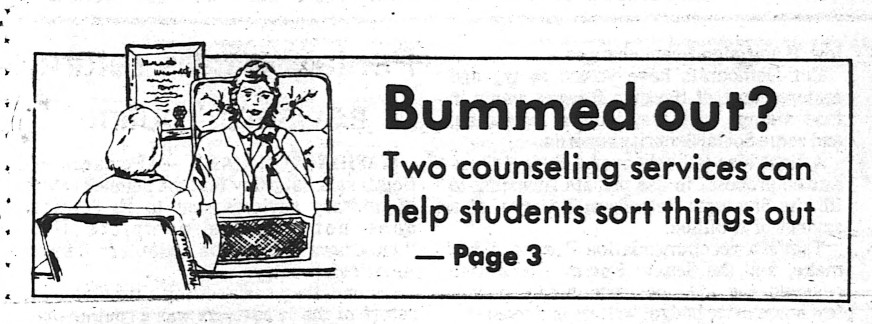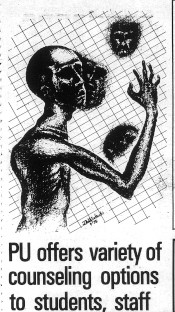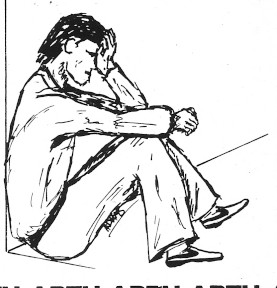Posted on January 15, 2020 by small20
The Modern History of Mental Health Services for Students at Purdue University
by Faith Zettler
Censoring Mental Health Issues?

My main focus going into this research was on mental health services and their history at Purdue through the perspective of a feminist lens. I originally believed that there would be more concern for the “psychological safety” of women, and that more females would be interviewed around the topic of mental health groups and clinics on campus. Yet there were not. Interestingly enough, many of the articles written about C.A.P.S. (Counseling and Psychological Services), P.C.G.C. (Purdue Counseling and Guidance Center), and other therapy groups were written by a majority female staff writers. I could have stopped at that in identifying women’s role in mental health, but I went on to discover one more vital piece of information: How mental health in these articles was addressed. These women spoke of Purdue’s clinics being able to treat or help cope with depression, anxiety, and even detailing drug problems on campus. Moreover, a 1947 article called the counseling services, “help with personal problems” or “someone to talk to,” and even “man-to-man conversation.” The then supervisor of the P.C.G.C. program, Dr. John M. Hadley was quoted as saying, “Counseling, as I see it is only a situation where one person sits down with another person who happens to have a little psychological training and experience, and they talk things over.” (1) Another article written by a 1978 male staff writer was titled, “Many places on campus ‘solve’ personal problems.” In the article, mainly an interview with Dean Beverley Stone, the dean addressed the resources “to help students learn how to cope with problems” or other “‘typical’ student concerns.” (2) I make these points mainly because most often, expressing emotions is seen as feminine and inappropriate for any man to openly discuss. The diction of the men is somewhat censored in how it dances around the subject of mental health and what people truly talk about in these private personal appointments and therapy groups. Most often this is because “people often feel there is a stigma related to obtaining such counseling” and that many “students fear they will be labelled as ‘mentally ill’ for seeking the help that they want.” (3) Every writer contributed to my unraveling of the history of a few of the most prominent mental health services established at Purdue in the twentieth century.

Students fear they will be labelled as ‘mentally ill’ for seeking the help that they want.”
(3)
The CAPStone of Purdue’s Mental Health Services – C.A.P.S. (Counseling and Psychological Services)
Due to HIPAA (Health Insurance Portability and Accountability Act) privacy rules, much of the information about Purdue’s C.A.P.S. (Counseling and Psychological Services) is kept under lock and key. What is known of C.A.P.S. is that it appears to have started in the late 1960s at Purdue. It is hard to track the history as the center changed names multiple times and some articles in past Exponent issues do not clearly I refer to C.A.P.S. or the Psychology Department’s own “student-run” counseling center P.C.G.C. (Purdue Counseling and Guidance Center).(4) Past names include the Psychological Services Center, Mental Health Clinic, and Mental Health Services, respectively. (5) In order to accommodate the students not willing or unable to book an appointment at the center, C.A.P.S. began hosting informational help sessions with the help of Purdue organizations to broad student audiences. These programs were hosted by presenters “sensitive to the students’ needs” and gave them the option to “actively participate or to remain anonymous.” (6)
Before 2015, C.A.P.S. and the Student Wellness Office at Purdue were both located at the Purdue Student Health Center. (The Student Wellness Office is now a part of the France A. Córdova Recreational Center or CoRec.) Similar to the outreach program of C.A.P.S., the Student Wellness Office initiated public educational programs to the community. An informational program hosted during Sexual Responsibility Week in 2000, “Let’s Talk About Sex,” also understood that many students did not think they could find opportunities to ask questions about sensitive subjects that they otherwise would not and gave them a private platform to do so. By running “Let’s Talk About Sex” in a different type of question-and-answer format, participants were able to “anonymously write their questions down,” and then have them “answered for the entire group.” (7)
P.C.G.C. (Purdue Counseling and Guidance Center)
Students with the test ‘jitters’ or other personality or psychological problems should not hesitate to head for the Psychological clinic in the Education Building.”
(10)
Many times since the 1980s P.C.G.C. has reported reaching maximum clientele capacity, frequently after students return from breaks. (8) The center has only increased in popularity due to its fee-free services and advertisements of assistance with personal “concerns” ranging from career issues, relationship difficulties, stress, and depression or anxiety. (9) But P.C.G.C. has older origins. It began in 1953 as a means for psychology students to practice their lessons on actual patients by talking about academic and personal problems in “strict confidence”. In 1962, a local newspaper section titled “Special Program” featured the Psychological clinic with the statement, “Students with the test ‘jitters’ or other personality or psychological problems should not hesitate to head for the Psychological clinic in the Education Building.” (10) The stigma of mental health in America, and the alternative wording meant to replace such direct terms, is still prevalent today. For example, the center now provides group therapy, preferring to call it a name more along the lines of discussion groups. (11)
One of the psychologists overseeing the training for psychology students through the counseling center, Dr. Servaty-Seib, met with me for this research and provided an abundance of helpful information and resources. Our main topic was another way she reached out to help the student population of Purdue in providing mental health services. Upon her arrival to Purdue University in the first half of the 2000s, Dr. Servaty-Seib was instrumental in changing how Purdue handled personal loss, mainly when it came to students.

The GAPS between grief and sympathy – G.A.P.S. (Grief Absence Policy for Students)
Many factors contribute to the mental health of students while attending college, including bereavement. But how did students receive help for this difficult period? The Office of the Dean of Students meets with a large number of students each year, many of whom are in the midst of facing a loss. In the early 2010s, after meeting with a number of these students, a staff member attempted to find helpful resources for these students who, much to their frustration, found nothing.
This is when G.A.P.S. (Grief Absence Policy for Students) was introduced. G.A.P.S. is not a standalone clinic, rather, it is a policy enacted through the Office of the Dean of Students, the center for nearly all student wellness services. G.A.P.S. was not well-known among the Big 10 college campuses or many other universities nationwide at the time and thus met with resistance if not hostility. For many years Purdue did not have an official, clearly stated policy for faculty to follow when students underwent the loss of a loved one. Originally, it was up to the discretion of the professor on how to handle the student’s anticipated absence(s) from class as well as late or unfinished assignments. According to Dr. Servaty-Seib, this created many problems ranging from complaints of unfair treatment to some students and others not even being offered a chance to make up assignments at all. (11) It took multiple years of a study of students who went through the O.D.O.S., for Dr. Servaty-Seib’s research team to find supporting evidence that the G.A.P.S. would be more beneficial over the informal approach, but the wait was worth it. The research team was able to prove that students who suffered a loss during the academic year at Purdue typically reached out for help more than other students, and despite doing so, still ended their semester with much lower grades and GPAs as a result of worsened mental health caused by grief. With this, they were able to prove that the policy was in fact a necessity for the student population. (12)
Today the Purdue Student Government is working on expanding the GAPS policy to provide additional days of bereavement beyond the current 1-3 excused days of absence (plus traveling days for cross-country travelers) as well as to expand the types of people a student is eligible to petition a grief absence to include people outside of the immediate family circle, including friends.
Summary
I began this research in order to examine men’s and women’s differing experiences of mental health services at Purdue. Due to societal stigma regarding the topic, I did not expect to find information dating back as early as the 1940s for mental health services on a historically conservative-leaning campus, but they were noticeably there. Moreover, it was interesting to witness the grammar shifts in describing illnesses and treatments over the decades, and most importantly who they advertised to. I found no support that the mental health services were gender-differentiated, but rather that they seemed to be sought out by male students just as often as female students. The centers may have changed locations and names overtime, but there is one thing they never did: their readiness to support and counsel the Purdue community by and large.
- Roy Proctor, “Little known service aids Psych. Students,” Exponent, (West Lafayette, IN), March 4, 1947.
- Francis Ferrell, “Many places on campus ‘solve’ personal problems,” Exponent, (West Lafayette, IN), February 8, 1978.
- Joyce Russel, “PU offers variety of counseling options to students, staff,” Exponent, (West Lafayette, IN), October 1, 1976.
- Susan Krauch, “Mental health help available,” Exponent, (West Lafayette, IN), February 21, 1979.
- Leah Petty, “Are college students cracking up?” Exponent, (West Lafayette, IN), January 16, 1965.
- Purdue Exponent news article by Kate Demmon, “3:3o Thursday programs provide help with everyday issues,” 25 September 2003, Purdue University Archives and Special Collections Vertical Files: Counseling and Personnel Services (CAPS), Purdue University Archives and Special Collections.
- Purdue Exponent news article by Sarah Szczepanski, “Group to hold events, activities for Sexual Responsibility Week,” Purdue University Archives and Special Collections: Student Wellness Office, Purdue University Archives and Special Collections.
- Sharon Klink, “Counseling services swamped after break,” Exponent, (West Lafayette, IN), March 23, 1981.
- Purdue Exponent news article by Kat Fritz, “Center offers free counseling to community,” 17 September 2003, Purdue University Archives and Special Collections Vertical Files: Counseling and Personnel Services (CAPS), Purdue University Archives and Special Collections.
- News Clipping from Lafayette Journal Courier, “Purdue Students Offered Services,” 8 October 1962, Purdue University Archives and Special Collections Vertical Files: Student Services, Purdue University Archives and Special Collections.
- Heather Servaity-Seib (Associate Dean of Students), interviewed by Faith Zettler of Purdue University, West Lafayette, IN, November 2019, personal communication.
- Heather L. Servaty-Seib, and Chye Hong Liew, “Advocating for Bereavement Leave Policies for College Students,” Journal of College Student Development 60, no. 2 (2019): 240-244. doi:10.1353/csd.2019.0021.
Banner Image Reference in bold.